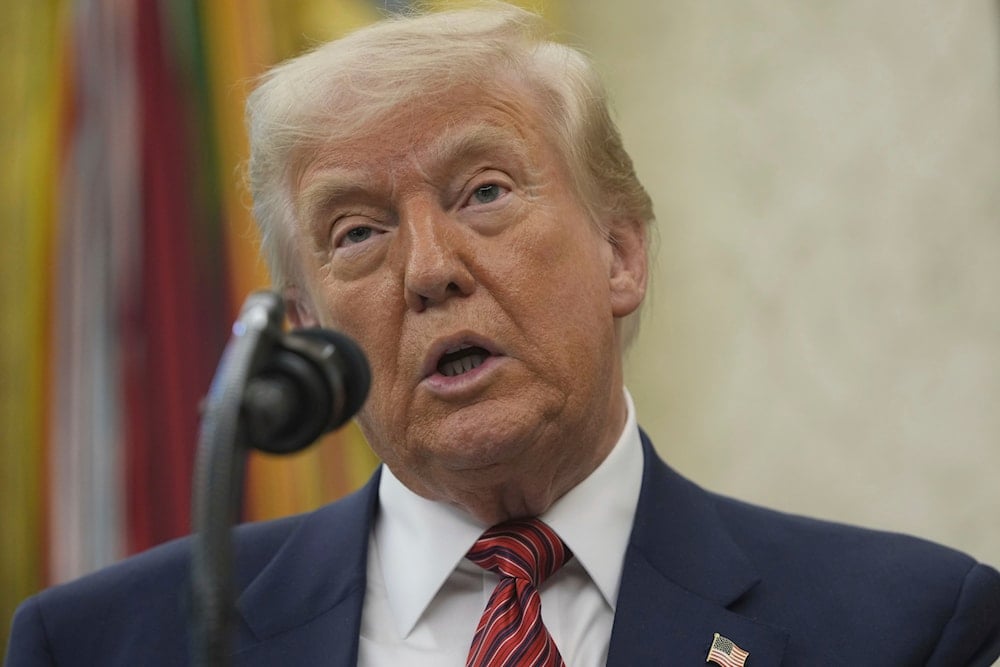China adapts as Trump faces scrutiny over softening tech restrictions
The United States delays new tech export restrictions to China amid ongoing trade negotiations and lobbying by Nvidia over its H20 chip.
-

US President Donald Trump speaks before David Perdue is sworn in as US Ambassador to China during a ceremony in the Oval Office of the White House, Wednesday, May 7, 2025, in Washington (AP)
The United States has put a hold on new restrictions targeting technology exports to China to avoid jeopardizing ongoing trade negotiations and to support President Donald Trump's efforts to arrange a meeting with Chinese President Xi Jinping later this year, according to the Financial Times, citing sources familiar with the matter.
In recent months, according to eight individuals, including current and former US officials, the Bureau of Industry and Security, which operates under the Commerce Department and oversees export controls, has received instructions to refrain from taking stringent actions against China.
On Monday, US and Chinese officials will hold a third round of trade talks in Stockholm, building on previous discussions held in Geneva and London.
Although Trump aims to avoid measures that could undermine efforts to engage with Xi, some officials contend that the US is constrained in enforcing stricter export controls due to concerns that China may retaliate by limiting exports of critical rare earths and magnets to the US, as it did for the first time in May.
Trump walks back on tech restrictions, faces objections
Earlier this year, Trump prepared to restrict tech exports to China, and in April, his team told Nvidia it would block shipments of its H20 chip, developed for China, after the Biden administration curbed sales of more advanced models, but he reversed course after direct lobbying from Nvidia CEO Jensen Huang.
At the center of the debate over the H20 chip are security officials, who warn of its potential to bolster China’s military, and Nvidia, which counters that cutting off US tech exports risks accelerating China’s domestic innovation efforts instead of stifling them.
A letter of concern to Trump
A coalition of twenty security specialists and ex-officials, including Matt Pottinger, who served as deputy national security advisor under the previous Trump administration, is set to submit a letter to Commerce Secretary Howard Lutnick on Monday outlining their shared concerns.
“This move represents a strategic mis-step that endangers the United States’ economic and military edge in artificial intelligence,” the experts wrote in the letter read by the Financial Times.
The letter's signatories include David Feith, who previously served as the National Security Council's senior technology official in the current Trump administration, along with Liza Tobin, a former NSC staffer during Trump's first term, as well as Kyle Bass, the founder of Hayman Capital Management and a prominent Trump supporter.
The experts warned that the H20 significantly enhances China's cutting-edge AI development, surpassing even the capabilities of Nvidia's restricted H100 chip in a crucial performance aspect.
In the letter organized by Americans for Responsible Innovation, critics warned that the H100 chip outperforms in AI inference and could accelerate China's development of autonomous weapons, surveillance systems, and other military tools. They argued the US is enabling Beijing's military modernization.
Frustration grows as Trump holds back on China
Beyond the debate over H20, US security officials and experts are growing increasingly frustrated with the Trump administration's reluctance to take stronger measures against China, with one former official expressing concern to FT that Trump has essentially stalled US export controls while conceding the H20 semiconductor without gaining anything in return, which they argue has weakened a vital national security instrument.
Steve Bannon, who served as White House strategist during Trump’s first term, criticized the decision to allow H20 chip sales to China, calling it a major mistake and saying, “American companies spent decades being made fools of, getting duped by the Chinese Communist Party, transferring the crown jewels of our technology. For that, they got nothing."
China counters US measures by launching alliances
While the US administration grapples with the issue of exports, Chinese AI firms have established two new industry alliances to build a domestic ecosystem to lessen reliance on foreign technology, particularly in response to US export controls that restrict access to advanced Nvidia chipsets.
The announcements were made during the three-day World Artificial Intelligence Conference in Shanghai, which concluded on Monday.
The "Model-Chip Ecosystem Innovation Alliance" unites Chinese developers of large language models (LLMs) with domestic AI chip manufacturers, creating what Zhao Lidong, CEO of participating chipmaker Enflame, described as "an innovative ecosystem that connects the complete technology chain from chips to models to infrastructure," according to Reuters.
The alliance, announced by LLM developer StepFun, includes other GPU manufacturers, such as Huawei, Biren, and Moore Threads, companies that have faced US sanctions restricting their access to advanced technology developed with US expertise, as these firms join forces to bolster China's domestic AI capabilities.
A second alliance known as the Shanghai General Chamber of Commerce AI Committee is focused on promoting the integration of AI with industrial transformation and includes participants like SenseTime, which is under US sanctions and has shifted from facial recognition to large language models, along with StepFun, MiniMax, another LLM developer, and chipmakers Metax and Iluvatar CoreX.

 5 Min Read
5 Min Read










